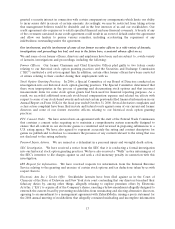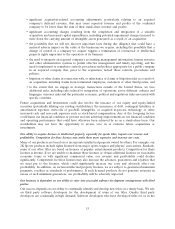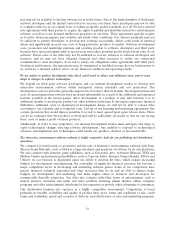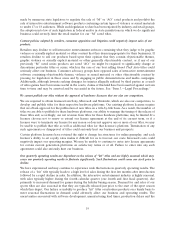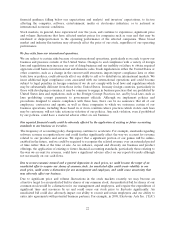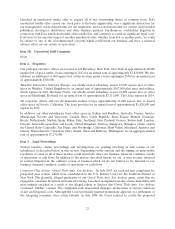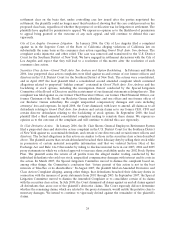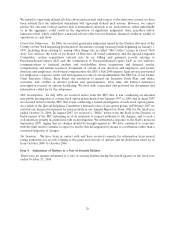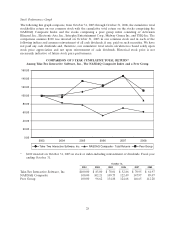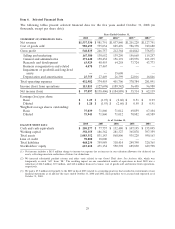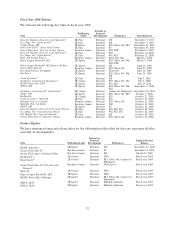2K Sports 2008 Annual Report Download - page 32
Download and view the complete annual report
Please find page 32 of the 2008 2K Sports annual report below. You can navigate through the pages in the report by either clicking on the pages listed below, or by using the keyword search tool below to find specific information within the annual report.financial guidance falling below our expectations and analysts’ and investors’ expectations, to factors
affecting the computer, software, entertainment, media or electronics industries, or to national or
international economic conditions.
Stock markets, in general, have experienced over the years, and continue to experience, significant price
and volume fluctuations that have affected market prices for companies such as ours and that may be
unrelated or disproportionate to the operating performance of the affected companies. These broad
market and industry fluctuations may adversely affect the price of our stock, regardless of our operating
performance.
We face risks from our international operations.
We are subject to certain risks because of our international operations, particularly as we seek to grow our
business and presence outside of the United States. Changes to and compliance with a variety of foreign
laws and regulations may increase our cost of doing business and our inability or failure to obtain required
approvals could harm our international and domestic sales. Trade legislation in either the United States or
other countries, such as a change in the current tariff structures, import/export compliance laws or other
trade laws or policies, could adversely affect our ability to sell or to distribute in international markets. We
incur additional legal compliance costs associated with our international operations and could become
subject to legal penalties in foreign countries if we do not comply with local laws and regulations which
may be substantially different from those in the United States. In many foreign countries, particularly in
those with developing economies, it may be common to engage in business practices that are prohibited by
United States laws and regulations, such as the Foreign Corrupt Practices Act, and by local laws, such as
laws prohibiting corrupt payments to government officials. Although we implement policies and
procedures designed to ensure compliance with these laws, there can be no assurance that all of our
employees, contractors and agents, as well as those companies to which we outsource certain of our
business operations, including those based in or from countries where practices which violate such laws
may be customary, will not take actions in violation of our policies. Any such violation, even if prohibited
by our policies, could have a material adverse effect on our business.
Our reported financial results could be adversely affected by the application of existing or future accounting
standards to our business as it evolves.
The frequency of accounting policy changes may continue to accelerate. For example, standards regarding
software revenue recognition have and could further significantly affect the way we account for revenue
related to our products and services. We expect that a significant portion of our games will be online-
enabled in the future, and we could be required to recognize the related revenue over an extended period
of time rather than at the time of sale. As we enhance, expand and diversify our business and product
offerings, the application of existing or future financial accounting standards, particularly those relating to
the way we account for revenue, could have a significant adverse effect on our reported results although
not necessarily on our cash flows.
Due to recent economic turmoil and a general depression in stock prices, we could become the target of an
unsolicited offer to acquire our shares of common stock. An unsolicited offer could create volatility in our
stock price, could create a distraction for our management and employees, and could cause uncertainty that
may adversely affect our business.
Due to significant price and volume fluctuations in the stock markets recently, we may become an
attractive target for an unsolicited bid for shares of our common stock. An unsolicited bid for shares of our
common stock would be a distraction for our management and employees, and require the expenditure of
significant time and resources by us and could cause our stock price to fluctuate significantly. An
unsolicited bid could also adversely impact our ability to recruit and retain employees and our ability to
enter into agreements with potential business partners. For example, in 2008, Electronic Arts Inc. (‘‘EA’’)
22



